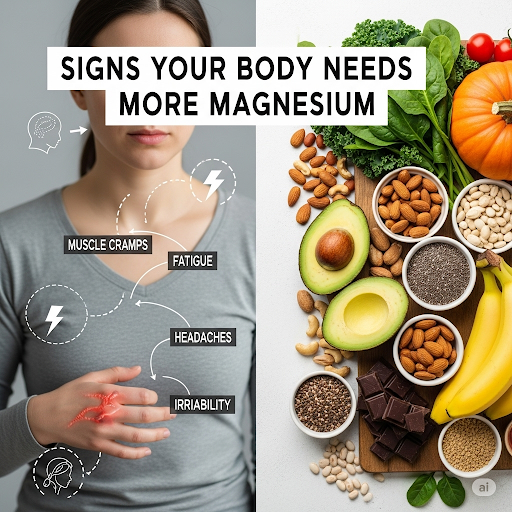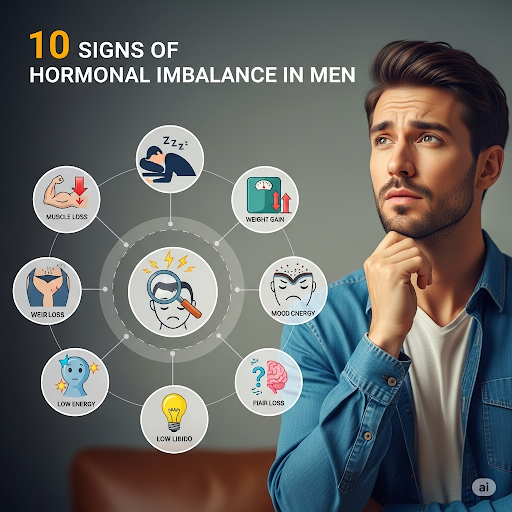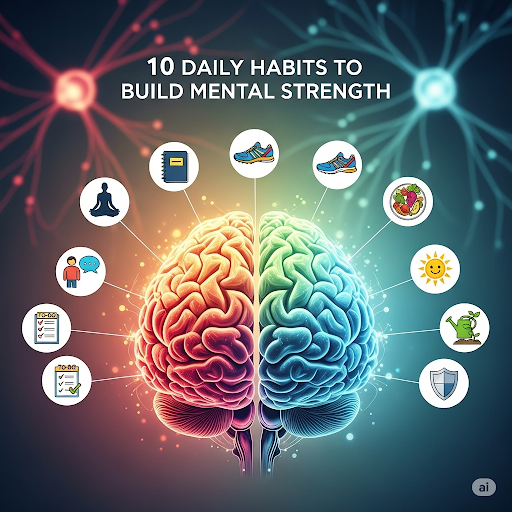Introduction: The Silent Spark Plug Behind It All
Magnesium doesn’t get the fanfare that calcium, iron, or vitamin D often receive. It’s the underdog of the mineral world quiet, behind the scenes, but absolutely essential. This mighty mineral is involved in over 300 enzymatic reactions in the body, helping with everything from muscle contraction to nerve function to energy production. Yet, many people walk around chronically deficient in it, not even realizing how crucial magnesium is until their body starts waving the red flag in strange, subtle ways.
You won’t always hear a doctor immediately suspect magnesium deficiency unless it’s severe, but your body might be whispering (or screaming) in its own quirky language. Let’s decode those strange signs your body may be begging for more magnesium.
1. Frequent Muscle Twitches or Cramps That Come Out of Nowhere
You’re sitting on the couch, minding your business, and suddenly your eye starts twitching or your calf seizes up like you’ve just run a marathon. Sound familiar? These twitches, spasms, or charley horses are some of the earliest and strangest signs of magnesium deficiency.
Magnesium plays a huge role in muscle relaxation. Without enough of it, your muscles become hyper-excitable, firing off inappropriately and cramping more easily. If you’re getting night-time leg cramps or your muscles feel tight even when you haven’t done much physical activity, it might be time to think about magnesium.
2. Anxiety That Feels Like It’s Coming From Inside Your Skin
Anxious thoughts can stem from many places, but if your nervous system feels chronically “on edge” you’re jumpy, restless, and struggle to wind down it could be a magnesium issue. This mineral is essential for calming your nervous system. It binds to and activates GABA receptors in the brain, which help reduce neural excitability and promote a sense of calm.
When magnesium is low, your nerves become hypersensitive. The result? That unsettling kind of anxiety that feels less like emotional worry and more like electrical tension under your skin.
3. Strange Numbness or Tingling in Hands or Feet
If you’ve ever experienced pins and needles, that bizarre buzzing or tingling feeling, and you can’t quite figure out why it might be your magnesium levels. Magnesium is involved in proper nerve function, and when there’s not enough of it, nerves can misfire or become overly sensitive.
This can cause tingling, prickling, or even a dull numbness in your extremities. It might start subtly, but if left unchecked, the sensations can become more frequent and uncomfortable over time.
4. Constant Fatigue Even After a Full Night’s Sleep
You go to bed early, wake up eight hours later and yet you still feel like you’ve been hit by a truck. Sound familiar? Magnesium is required for the production of ATP, the molecule your cells use to store and transfer energy. Without enough magnesium, your body literally can’t produce energy efficiently.
Even mild magnesium deficiency can leave you feeling sluggish, drained, and foggy. And no amount of caffeine can truly override that fatigue if your cells are running on empty.
5. Unexplained Insomnia or Tossing and Turning All Night
Magnesium helps the brain and body relax by regulating neurotransmitters that quiet the nervous system and help you fall asleep. It also plays a role in maintaining healthy levels of melatonin, the hormone that governs your sleep-wake cycles.
So when your magnesium is low, sleep can become a nightly struggle. You may have trouble falling asleep, staying asleep, or waking up frequently for no apparent reason. That racing mind at 2 a.m. or restlessness that kicks in the moment you lay down? Magnesium might be the missing link.
6. Headaches or Migraines That Just Won’t Quit
Recurring headaches or migraines can be more than just stress or dehydration they can also point to low magnesium. This mineral is essential for healthy blood vessel function and helps regulate neurotransmitters involved in pain perception.
Magnesium deficiency can cause the brain’s blood vessels to constrict or spasm, which is a known trigger for migraines. If your headaches tend to hit hard and hang around, especially if they come with light sensitivity or nausea, low magnesium could be lurking behind the scenes.
7. Heart Palpitations or Irregular Heartbeats
It’s scary to feel your heart skip a beat, flutter, or pound when you’re not even exerting yourself. While this can have many causes, magnesium plays a crucial role in maintaining normal electrical activity in the heart. When your levels drop, your heartbeat can become irregular or overactive.
If your heart flutters come with other symptoms like muscle twitches, fatigue, or anxiety it’s worth considering magnesium. Always rule out serious cardiac issues first, but don’t ignore this mineral as a potential piece of the puzzle.
8. Unexplained PMS or More Intense Menstrual Cramps
Ladies, if your period has recently started feeling more like a war zone more cramps, more irritability, more bloating your magnesium levels might be dipping around your cycle. Estrogen and progesterone shifts can affect magnesium levels, which is why many women feel worse in the days leading up to their period.
Magnesium helps relax uterine muscles and regulate mood. A deficiency can make everything feel sharper, tighter, and moodier. Supplementing with magnesium has even been shown to reduce PMS symptoms in some women.
9. Weird Food Cravings – Especially for Chocolate
Ever get a powerful craving for chocolate, particularly dark chocolate? That’s not just your sweet tooth talking. It might be your body’s way of asking for magnesium. Dark chocolate is one of the richest dietary sources of magnesium, and cravings for it can spike when your body needs more of the mineral.
So the next time you’re obsessively thinking about chocolate, consider that it may be your body’s subtle SOS for magnesium not just a sugar fix.
10. Brittle Nails, Hair Loss, or Dry, Irritated Skin
While many people look to biotin or collagen to strengthen hair and nails, magnesium also plays an underrated role in cellular regeneration. It helps maintain healthy protein synthesis, which supports the structural integrity of skin, hair, and nails.
Low magnesium can lead to brittle nails, thinning hair, and skin that feels more dry, sensitive, or prone to irritation. When the building blocks for renewal are missing, your body starts to cut corners and your outer beauty can be one of the first places it shows.
Final Thoughts: Don’t Ignore the Whispers
Magnesium deficiency doesn’t always scream it often whispers. It nudges you with strange sensations, low energy, disrupted sleep, and odd cravings. Because the symptoms are so varied and subtle, many people go years without realizing what’s really missing.
If several of these signs resonate with you, it might be worth looking at your magnesium intake. A simple blood test can help but keep in mind that serum magnesium tests don’t always reflect total body stores, since only about 1% of your body’s magnesium is found in the blood.
Instead, start with diet. Load up on magnesium-rich foods like leafy greens, nuts, seeds, avocados, legumes, and whole grains. And if needed, consider a magnesium supplement especially magnesium glycinate or magnesium citrate, which are well absorbed and gentle on the stomach.
A small mineral with a mighty role magnesium might just be the quiet hero your body’s been waiting for.
Would you like a follow-up on best magnesium supplements or a sample magnesium-rich meal plan? Just say the word!












